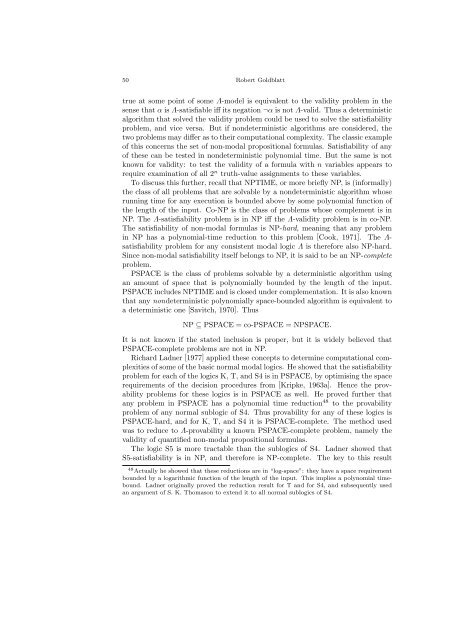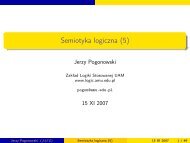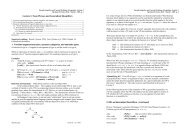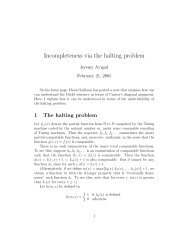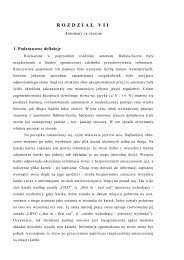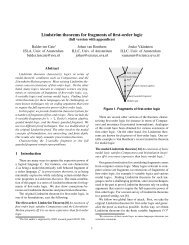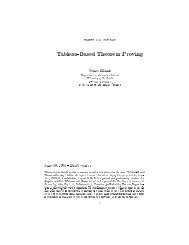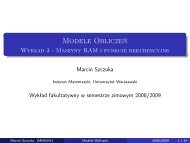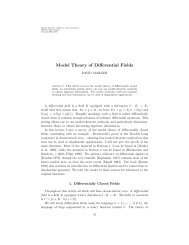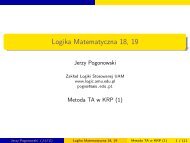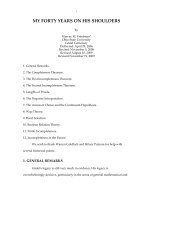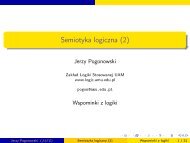MATHEMATICAL MODAL LOGIC: A VIEW OF ITS EVOLUTION
MATHEMATICAL MODAL LOGIC: A VIEW OF ITS EVOLUTION
MATHEMATICAL MODAL LOGIC: A VIEW OF ITS EVOLUTION
You also want an ePaper? Increase the reach of your titles
YUMPU automatically turns print PDFs into web optimized ePapers that Google loves.
50 Robert Goldblatttrue at some point of some Λ-model is equivalent to the validity problem in thesense that α is Λ-satisfiable iff its negation ¬α is not Λ-valid. Thus a deterministicalgorithm that solved the validity problem could be used to solve the satisfiabilityproblem, and vice versa. But if nondeterministic algorithms are considered, thetwo problems may differ as to their computational complexity. The classic exampleof this concerns the set of non-modal propositional formulas. Satisfiability of anyof these can be tested in nondeterministic polynomial time. But the same is notknown for validity: to test the validity of a formula with n variables appears torequire examination of all 2 n truth-value assignments to these variables.To discuss this further, recall that NPTIME, or more briefly NP, is (informally)the class of all problems that are solvable by a nondeterministic algorithm whoserunning time for any execution is bounded above by some polynomial function ofthe length of the input. Co-NP is the class of problems whose complement is inNP. The Λ-satisfiability problem is in NP iff the Λ-validity problem is in co-NP.The satisfiability of non-modal formulas is NP-hard, meaning that any problemin NP has a polynomial-time reduction to this problem [Cook, 1971]. The Λ-satisfiability problem for any consistent modal logic Λ is therefore also NP-hard.Since non-modal satisfiability itself belongs to NP, it is said to be an NP-completeproblem.PSPACE is the class of problems solvable by a deterministic algorithm usingan amount of space that is polynomially bounded by the length of the input.PSPACE includes NPTIME and is closed under complementation. It is also knownthat any nondeterministic polynomially space-bounded algorithm is equivalent toa deterministic one [Savitch, 1970]. ThusNP ⊆ PSPACE = co-PSPACE = NPSPACE.It is not known if the stated inclusion is proper, but it is widely believed thatPSPACE-complete problems are not in NP.Richard Ladner [1977] applied these concepts to determine computational complexitiesof some of the basic normal modal logics. He showed that the satisfiabilityproblem for each of the logics K, T, and S4 is in PSPACE, by optimising the spacerequirements of the decision procedures from [Kripke, 1963a]. Hence the provabilityproblems for these logics is in PSPACE as well. He proved further thatany problem in PSPACE has a polynomial time reduction 48 to the provabilityproblem of any normal sublogic of S4. Thus provability for any of these logics isPSPACE-hard, and for K, T, and S4 it is PSPACE-complete. The method usedwas to reduce to Λ-provability a known PSPACE-complete problem, namely thevalidity of quantified non-modal propositional formulas.The logic S5 is more tractable than the sublogics of S4. Ladner showed thatS5-satisfiability is in NP, and therefore is NP-complete. The key to this result48 Actually he showed that these reductions are in “log-space”: they have a space requirementbounded by a logarithmic function of the length of the input. This implies a polynomial timebound.Ladner originally proved the reduction result for T and for S4, and subsequently usedan argument of S. K. Thomason to extend it to all normal sublogics of S4.


